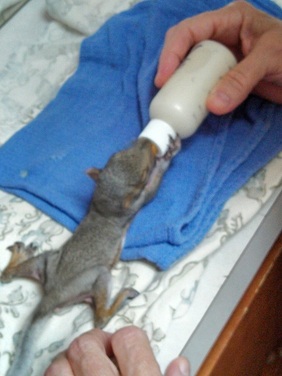
Our Discontent
This late summer/early fall, nothing was going the way it should, it seemed to me.
I was not appreciated, no one would cooperate, no one would work with me. I was in a state of high dudgeon. Forget maturity and reality. I was in full-on sulk. It happens. So I put my head down and determined to run into, rather than go around the next wall.
Animals don’t give a shit about the snit you’re in. You still have to feed them, and water them, and look into their eyes and see how they’re doing. They depend on you, and you’ve got their lives in your hands (and I’ve got the vet bills to prove it).
In the mornings, I bathe, feed & commune with Steve the Dragon & Little Doric the Dragon. I make sure that Miss Brownie and Mr. Big Leilani have fresh water and hay and pellets and some kind of fresh fruit or vegetable. Big Girl & Bernie Potato Turtle get their pellets every other day or so, while Baby gets fed every day, because he’s so small. Check their water & filters, maybe pop another piece of fruit or a cricket into their tanks. Both Big Girl and Bernie will eat from my hand (if they’re interested in what I’m holding).
We have some foster squirrels in; we’ve had 8 his season, of whom two have passed away, which is always a sad thing, but sometimes inevitable by the time they get to us. Our attitude is that even if they aren’t going to make it, they’re going to be warm and indoors and with whatever comfort we can give them.
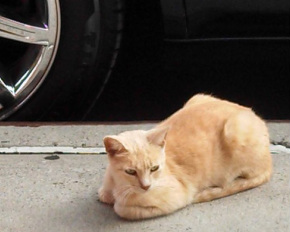
It’s pretty hard to both sulk and take care of animals at the same time. But I do my best. A few weeks ago, when I was coming home, probably from a play or a class, which both feeds and lifts my darkness, I noticed a little yellow cat in front of our building. There are some cats in our neighborhood, and sometimes I see them sitting under cars, or hightailing it down the street. I don’t engage. I’m allergic to cats, anyway.
We did have cats, and dogs (which I’m also allergic to), when I was growing up. The urge to be close to them battled with my urge to breathe. The allergies were always thought of as my own problem, or as my mother told me: it’s not that bad, take a pill. When you say things like that to a playwright, they tend to end up in plays.
My wife sometimes brings up the idea of having a dog, and I say you know we can’t, because I’m allergic, and she says: but if we had a yard or something, and that’s also a painful road that leads back on itself.
The next morning the little yellow cat was still outside our building. Several of the kids who were waiting to walk to school were oohing and aahing, and taking pictures with their phones. I looked at it, and the cat came right up to me and brushed against my legs. I wondered what to do. I wondered if it was hungry.
It didn’t have a collar, was small and thin, but unlike the other street cats, it met my eye and came up to me. Suddenly, I couldn’t leave until I’d done something. I went upstairs and found a can of sardines, and brought it back down. The cat walked over to them, and licked all the oil off the top and began to groom itself. I started shooting out emails and making phone calls. Between the squirrel underground and friends who blog about their own feral cats, I soon reached someone who said: if you want to catch it, put a towel over it then slide it into a carrier.
Like that was going to happen.
I brought down a carrier we use for the smaller animals, and tried to coax it in. Nothing doing. She wandered away, not far, to a driveway down the street, behind a fence, and proceeded to sit under a truck and look at me. I had to go to work.
I consulted with someone who has owned many cats in her life (my wife) that night, and we went downstairs. The little cat was still there, and came up to both of us, and rubbed against us and meowed, and when I put a plastic container of water down, drank from it. I noticed that there were small cans and cups of cat food at a telephone pole a few doors down, and a small collection of them behind a green gate that opened onto an alley that led back to a courtyard behind a building a few doors down.
My wife attempted to throw a jacket over the kitty, but that didn’t do much but drive it away, and it skedaddled into the darkness.
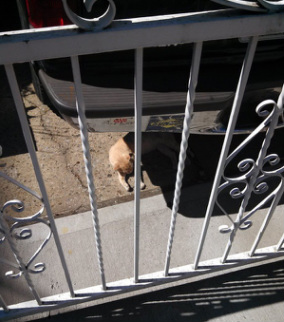
T
Mimi the Bohemian
The next night, I bought cat food on the way home, and put it out by our building. A young woman with long blonde hair and bright red lipstick saw me doing this and said: Are you feeding Mimi too? The cat had a name, and it was Mimi.
From the girl with blonde hair and a few other people on the street, including some in my building, I pieced together a history of the little yellow cat. She used to belong to an old man, who had to be put into a nursing home in the late spring. Either there was no one to take her, or she got out & no one brought her back in. She had been living on the street since then. I could feel the chill of fall in the air. The girl said she’d got the cat to sit on her jacket, and Mimi would accept caresses, but wouldn’t let anyone pick her up.
At least one building super didn’t like the cat food, and I saw a few tins and cups tossed or kicked over on the sidewalk. One night, I saw Mimi cross the street to talk to some people she knew, and she almost walked in front of a car.
The other thing that’s been consuming me so far this season has been The Hill Town Plays, which I blogged about here. At “Stay,” the final play in the cycle, I turned to see a friend in the row behind me. She was there as a guest of someone who votes on these things. Afterward, we walked to the subway, and the voter said dismissive things about a play I thought capped off an epic cycle, and it put me in mind of the other people whose bits of conversation I’d overhead throughout the run: those who were dismissive of the plays’ working class settings and characters. At “Scarcity,” the guy next to me critiqued the set as “fine if you like that sort of thing,” then pointing at the stack of videos on the set, he commented: people like that…like war movies. And I was sitting right next to him, and I looked at the videos, and there wasn’t one war movie in the pile.
So I changed the subject, and told my friend about the little yellow cat and she said she knew a rescuer.
I kept feeding the kitty, and talking to people on my block. There were kids who loved the cat, and a little boy who watched her from a second-floor window across the street. A beagle on a balcony kept an eye on us a well. One night a woman in a minivan going through the McDonald’s drive through came over with a bag of food and said she fed the cats a block away, and wanted to know if this one needed anything. And I said I was working on it.

Who Are the People in
Your Neighborhood
The older women who sit in folding chairs outside of their houses and talk and keep an eye on the neighborhood (even the new buildings) sometimes looked over and seemed to be mystified by the people who fed a cat. Sometimes they took a closer look when with they came and went from the supermarket.
There’s the lady who lost her husband earlier this year; we used to see him walk around, then sit outside in his wheelchair. Then it was just her, and her son has moved in to help out. Her husband’s sisters still live in the neighborhood. They all grew up on this street, many in the houses they still live in, up from where the old cement factory was. It’s now Socrates Sculpture Park. When we went down there to the greenmarket on the weekends, we used to say hi to Tony & his wife and show them our produce.
The other cats stood just outside my physical presence: there was a bigger orange one, and a large black one, and a gray and white one. They didn’t let people near them. Not like Mimi, who seemed to need the company as much as the food.
Then I didn’t see her for a day or two and thought someone might have taken her in. I kept a couple of cans of cat food around, and hoped for the best. I saw the man who owns the car she liked to rest under and asked if he’d seen the little yellow cat and he pointed, and I saw her disappearing into a garden by the alley. In the courtyard, someone had left out a big bowl of food and water.
I emailed the friend of the friend, who emailed yet another friend. The cat rescuer had the name of an archangel, which I thought was a good sign. He said he’d come over and check Mimi out. We spoke on the phone and he asked if I had a carrier, and I said yes. Was it big enough? He asked. I didn’t know.
At class one of those nights, I showed a friend a picture of the cat and told her about my mission/obsession. She looked at the picture and said: if you get her, let me know. I might be interested.
I called my vet's office and asked what I should do with a rescued cat. They said to bring her by if I got her, and they would examine her, and could spay her at a discount if she needed it.
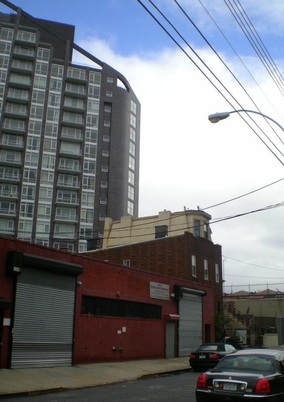
Living the High (Rise) Life
The cat rescuer came over and I showed him the places where she ate, and we went back to the courtyard. She was sitting there, and got up and stretched. The cat rescuer sat down quietly on the wall, and then opened a bottle of chicken baby food and began to make a clucking noise. She came right over to him, and began to lick the food from the lid. He let her do it for a minute, then quickly grabbed her by the neck, which is called “scruffing” and said: Get the carrier! I opened it, and he tried to slide her in, but it was too small, and she was getting more alarmed. He let her down, and she took off lickety-split.
He told me he didn’t want to force her in, as she could have been hurt. She disappeared through a hole in the fence, and I could tell how disappointed we both were.
He scouted the neighborhood and went to the alley that runs down the middle of our block. He saw Mimi sitting on an old machine in an overgrown lot behind a chain link fence. Next to the lot is an abandoned house, where the plants and trees seem to be growing right into the building. It’s boarded up, and sits quietly disappearing across the street from the high school. We guess that when someone finally buys it and knocks it down, they’ll use the lot and the one next door to build another of the many high-rises springing up around here. (Forgive my hypocrisy; I live a high-rise on the corner).
When I moved to the neighborhood, a South American steakhouse stood on my corner, and there was an Italian restaurant down the block that had a mechanical statue of a gondolier on top of it. Then it was a Philippine restaurant, now it’s for rent.
The cat rescuer scouted around the alley some more, and discovered that there is a feral cat colony living in one of the garages. He said Mimi wasn’t feral, that she would never have gotten so close to him and even when he grabbed her, she didn’t bite or scratch him. He wanted her off the street, but eventually decided she wouldn’t get close to us again that day, and maybe not the next.
Two days later, he came back, after instructing me to remove all the food from her regular places, and give her only a small amount. Street cats, he explained, are motivated by hunger, and if she was hungry, she’d come back to us for food…but not to let her get so ravenous she’d cross the street.
I made signs and put them up at the feeding spots, asking people not to put down food, and saying we’d be trying to rescue her that weekend. Everyone complied, except for someone who left a big can of food and water in the courtyard. When I called to her the night before the rescuer came back, I heard a woman calling to her from down the alley, and pretending to meow. The cat rescuer said sometimes people think of the street cats as “theirs” and don’t want them to go away. They either can’t or don’t take them in. But since Mimi was not feral, and not part of the colony, he didn’t think she’d be able to survive the winter on her own.
I was not sleeping well. I was convinced it was my fault we hadn’t got her the first day, and that I’d scared her off and we wouldn’t be able to get her to come to us again. I had dreams about the cat, moving just out of my grasp, and gave up on a full night’s sleep for a day or two. The cat rescuer said it’s much better to get them the first day, because you think they’ll be all right until you come back, but something happens, or you never see them again, and you’re always left to wonder.
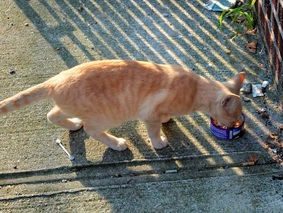
The Second Act Begins
My wife and I went out to locate Mimi in the morning, and found her asleep in the middle of a trashbag. I worried that it wasn’t a natural thing for a cat to sleep out in the open during the day, and that she’d been injured or poisoned. I wondered what I would do if we were too late.
When the cat rescuer arrived, we staked out the courtyard, and the alley. He’d brought a carrier and a Hav-a-Heart trap, and set them up. He visited the feral colony again, and showed me where they went in and came out of the garage. He estimated that there were at least 8 cats, including some adolescents; almost past the point where they could be taken off the street. After about 4 months, he said, they generally can’t adapt to indoors. He talked about getting some friends who do T/N/R (trap, neuter, release) to stabilize the colony soon. In the winter, he said, they sleep in a big pile to keep their warmth.
It was almost sunset, and he moved the Hav-a-Heart a bit next to the fence she sometimes walked through, and I was in the courtyard, making sure there wasn’t food left out, and getting ready to wind it up for the day, expecting another night of worry. Then my phone rang, and he said: bring the towel! She’s in the Hav-a-Heart.
I ran around the corner, well most of the way. We draped a towel over the trap, and she meowed anxiously. He said we needed something to completely cover her. That’s what we do with the little animals. If they are completely in the dark in a carrier, they calm down, even go to sleep. So I got a sheet and we wrapped the trap, and I managed to get it upstairs and in our bathtub. He had showed me how to put food and water in it, and newspaper for her to poop and pee. The rescuer reached in and rubbed her head. A feral cat would never have let me do that, he said.
That was one confused cat in the trap in my bathtub. She let me touch her through the cage, and was quiet. She didn’t touch the food I had left for her, though in the morning, when I put some dry food next to her on the newspaper, she scarfed it down.
I headed out in the rain with a sheet-covered Hav-a-Heart to hail a cab. Surprisingly, one stopped, and I wedged in Mimi and me, and he took me to our vet’s office and wished us well. The staff congratulated me when I said: I got her! Our vet seemed both amused and touched at the story. He’s been our vet since we brought in a tiny turtle that I’d bought on a street corner and said: she doesn’t look well. (The turtle lived, after a shot of Vitamin A & Baytril).
He and his assistant gently got Mimi out of the Hav-a-Heart, and she was a good girl: she didn’t hiss or claw, but sat there quietly as he examined her. She hadn’t been spayed and he asked if I wanted him to do it. The cat rescuer said he had a certificate that could get it for free at the ASPCA, but I thought we didn’t know where she was going to end up, and I didn’t want neutering her to be something that slipped through the cracks. So I said go ahead.
Even with the courtesies and discounts (and they were generous with them), I winced at the bill. I’d already decided to cover her expenses, and in fact had a windfall come in the week before. And whenever I get a sudden influx of cash, it’s been my hard and fast rule (even in the days when I had one pair of jeans and one pair of sneakers) to give some of it away. Money is energy, money is me. I give myself away, and there’s room for something else to come in. I am growing my hair to give away (and I hope it’s long enough soon, because I’m getting pretty tired of it).
To quote one of my own plays, it doesn’t matter why you give, it only matters that you do. I don’t think of myself as a good person by nature or instinct, but I admire them, and try to imitate them, and do the things that they do.
I produce my own plays both because I want to see them done, and because it’s another kind of giving away. And, I realize, as stressed out and anxious as I get when there’s another damn hitch in the works, I feel most engaged when I’m unknotting the problem, or figuring out a way around it. Call Mimi "The Fall Production." She cost much more than producing a 10-minute play in New York, but less than a one-act play in a NYC festival, and more than round-trip airfare to an international festival.
I went to work and got a call from the vet later. He’d performed the surgery and discovered that Mimi had a serious infection in her uterus, but he’d been able to successfully remove it. I Googled the condition and realized that she’d been pretty sick, and if we hadn’t gotten her in, she most likely would have died of the infection, and probably painfully and alone.
I called the friend who was interested in Mimi, and she said she’d foster the kitty and see if they got along. I thought that was fair enough: sometimes an animal and a human aren’t a match. I asked the vet if they had a spare carrier. I realized that the people who bring their pets in for the last time don’t take them home, so there might be some carriers around. And there were. They gave us medications and instructions and we went out to hail a cab.
The cab was one of the new green ones you can hail in the boroughs. We were his first passengers in the car, which he was taking out for the first time. Mimi meowed a few times, and when we got out, we covered the carrier with a jacket, and then we were at my friend’s corner in Manhattan. The driver wished us luck, and said he was glad he'd carried us for his first fare in the new vehicle.
Once inside, we put the carrier on her sofa and opened its door, and in a little bit, drawn by the food and water just outside it, Mimi stepped out and ate and drank. She talked. It was hard to leave her, and my wife took it worse than I did. But then, I knew we’d never keep her. Aside from the fact that I’m still-and-always allergic, we also have an apartment full of little critters that might appear to a cat like chew toys.
It’s been almost a week, and I’ve been getting updates from my friend, and passing them along to the cat rescuer, who told me he’d developed a fondness for the little yellow cat. There are tips being exchanged on helping Mimi adjust to being an indoor cat again, and she’s still kind of shell-shocked by the whole thing.
I hope it works out with my friend, and if they aren’t a match, then I know we’ll still be able to find her the right place. And I thought of all the people who’d helped, and given advice, and just sent good wishes, and how grateful and relieved we were when Mimi finally came indoors.
I put a sign on the telephone pole people know Mimi was off the street. It’s raining pretty hard right now, and I’m glad the little yellow cat isn’t out in it. There are a lot of other cats out there, though. The house across the alleyway is still abandoned, and I hope the cats and other little friends who don’t have anyone can hole up in it when it’s cold and rainy. Until someone builds a high rise.
The logjam in my creative life is breaking up a bit. Not always in ways I’d like it, but there’s movement. I’m still worried about the show I’m supposed to take up in Provincetown in just over two weeks. But I can solve that. I’ve done one Fall production, I can work on the next one.
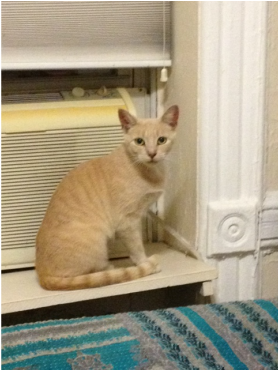


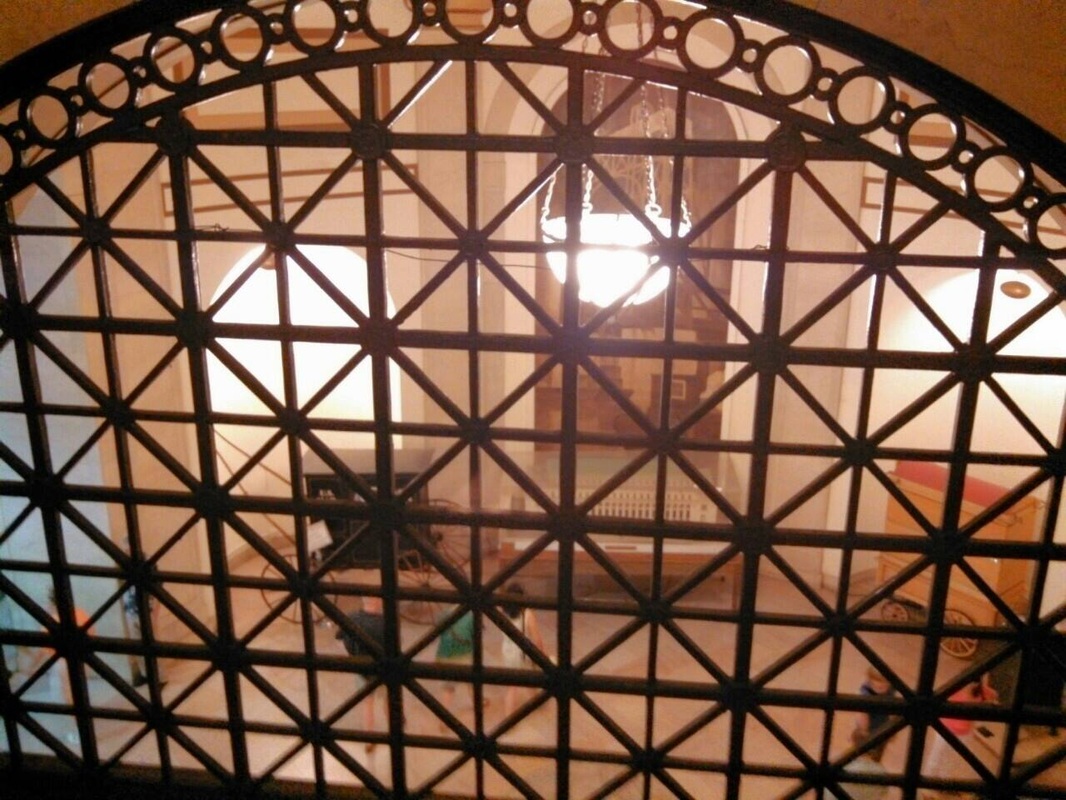


 RSS Feed
RSS Feed
